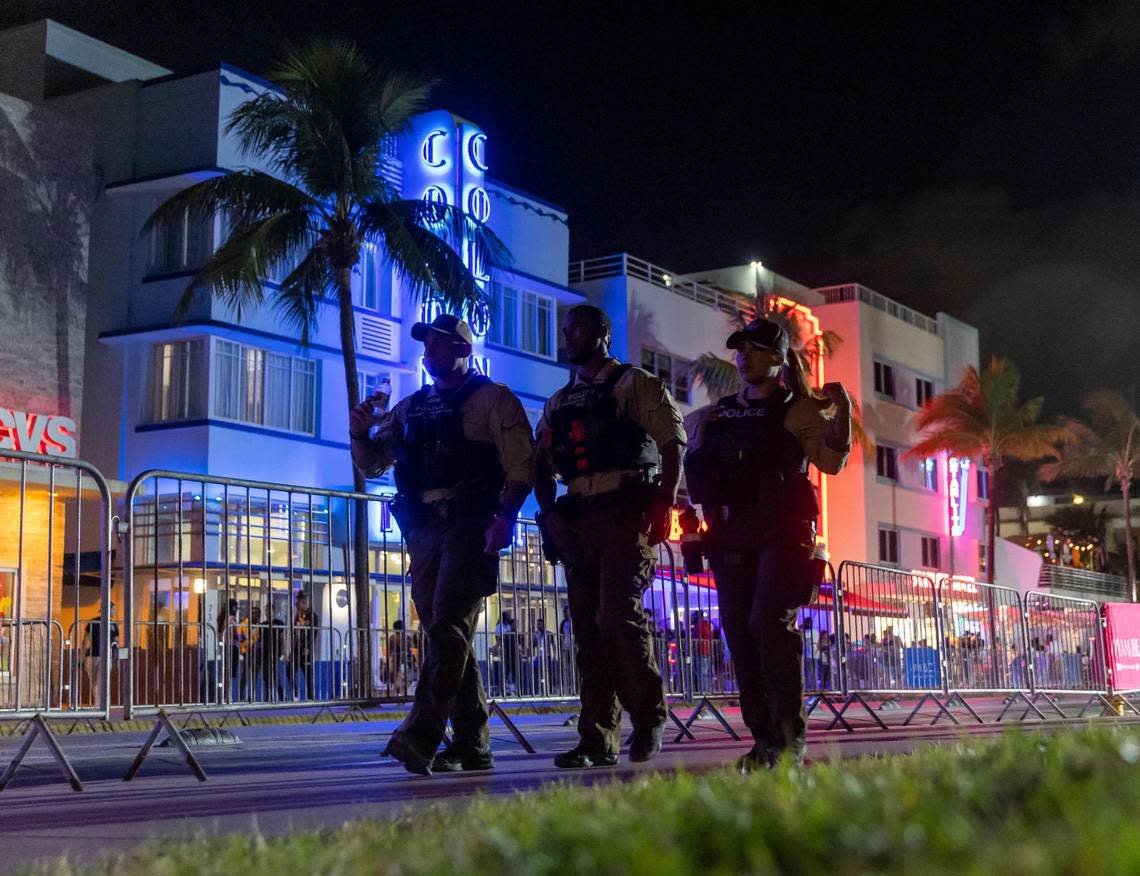Miami Beach officials vote for a curfew and secured perimeter during spring break 2024

Miami Beach elected officials voted Monday to support a curfew in South Beach, a secured perimeter around Ocean Drive and a rollback of alcohol sale hours during the peak of spring break in March 2024.
The move comes on the heels of a month that saw big crowds and two deadly shootings on Ocean Drive, one year after a pair of shootings injured five people on the same street during the same weekend in March.
Multiple city commissioners said they wanted “draconian measures” to try to prevent spring break crowds from visiting and congregating in South Beach.
“Spring break as we know it is over,” said Vice Mayor Steven Meiner. “Completely over. We’re done.”
The details of the measures still need to be hashed out.
Commissioners directed City Manager Alina Hudak and her staff to consider what times and dates a curfew should be in place, how to establish a secured perimeter around the city’s most iconic commercial strip, and the specifics of a liquor sale rollback.
Officials said the measures should perhaps apply from the second weekend of March through the third weekend, a period of more than 10 days. Those weekends, particularly the third, have brought the biggest crowds to South Beach in recent years.
“The message has to be resoundingly clear: Miami Beach is shutting down spring break,” Commissioner Alex Fernandez said.
After the second fatal shooting earlier this month, Hudak enacted a midnight curfew for one night. The city commission voted not to reissue a curfew for this past weekend, when crowds were smaller.
Is there a stronger legal argument for the city now?
Some Miami Beach residents questioned why the city hadn’t announced a curfew earlier, in anticipation of the third-weekend crowds, rather than waiting until deadly incidents took place.
Officials said legal concerns were a significant factor. Last year, a Miami-Dade Circuit Court judge struck down the city’s attempt to impose a 2 a.m. alcohol curfew in South Beach during spring break after the Clevelander hotel filed a lawsuit.
But City Attorney Rafael Paz said Monday that, given the pattern of spring break violence and unruly crowds over several years, he believes the city now has a strong legal case to announce safety measures ahead of time.
“We now have a record, year after year, of the same problem on the same weekend in the same area,” he said.
The city’s safety measures could potentially include ticketed events with metal detectors to try to prevent people from bringing guns to Ocean Drive. That would require the city to book events in the coming months and figure out the logistics of closing off an area surrounded by a public beach and numerous points of entry.
Officials said they hope announcing the moves in advance will discourage tourists from coming to Miami Beach next March to drink and party during spring break.
“The entire month of March should just be family beach month,” Commissioner Kristen Rosen Gonzalez said. “We’re going to turn into, like, Naples for the month of March.”
Commissioner Ricky Arriola, who voted for a secured perimeter and alcohol sale rollbacks but cast the lone vote against the preemptive curfew, said that approach would hurt nightlife and other businesses and send the tourist hub down the wrong path.
“Be careful what you turn off, because you may never be able to turn it back on,” he said. “I, for one, don’t want to become Naples because I choose to live in Miami Beach.”
Cultural program questioned
Miami Beach officials spent more than $3 million for a second straight year on programming during each weekend of March on Ocean Drive, in nearby Lummus Park and on the beach. But it didn’t deter large spring break crowds from gathering in the area.
Some observers, such as the rapper and promoter Luther “Uncle Luke” Campbell, have criticized the city for failing to create a safe environment and programming that appeals to the young, Black visitors that make up the majority of spring break visitors to Ocean Drive — and for using spring break chaos to justify the city’s broader move away from nightlife and toward a quieter, more residential feel.
Others, including city officials, have pointed out that spring breakers seem to come for the weather and the block party atmosphere, not to attend events.
The preemptive safety measures, Mayor Dan Gelber said Monday, are “how we message to the world that maybe they want to go somewhere else.”

 Yahoo Movies
Yahoo Movies 
